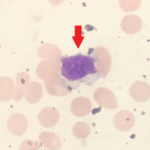A rheumatologist sees a 60-year-old male with rheumatoid arthritis for a subsequent hospital visit two days following an uncomplicated total knee replacement.
The patient is expected to be discharged tomorrow and reports he is having some discomfort in the operative knee, but the pain is tolerable with oral hydrocodone/acetaminophen. The patient denies any other complaints. His nonsteroidal antiinflammatory drugs (NSAIDs) and methotrexate were discontinued one week preoperatively, and he is on aspirin for thrombus prophylaxis and an intermittent pneumatic compression device, ordered by the orthopedic surgeon. The orthopedic surgeon has ordered a visiting nurse and physical therapy after discharge.
At the time of the examination, the patient is alert and oriented. His vital signs are normal, lungs are clear, and his heart has a regular rate and rhythm with no murmurs or friction rubs. He has good peripheral pulses and his abdomen is soft, nontender, and has no masses or holo-systolic murmur. The surgical dressing on his right knee is dry and intact with a knee immobilizer and intermittent pneumatic compression device in place. The patient has a slightly decreased extension in his right elbow, bony proliferation, and mild boutonniere’s deformities in his fingers. He is asked to schedule a rheumatology follow-up office visit in three weeks, and will restart NSAIDs and methotrexate once cleared by the orthopedic surgeon.
How should this visit be coded?

